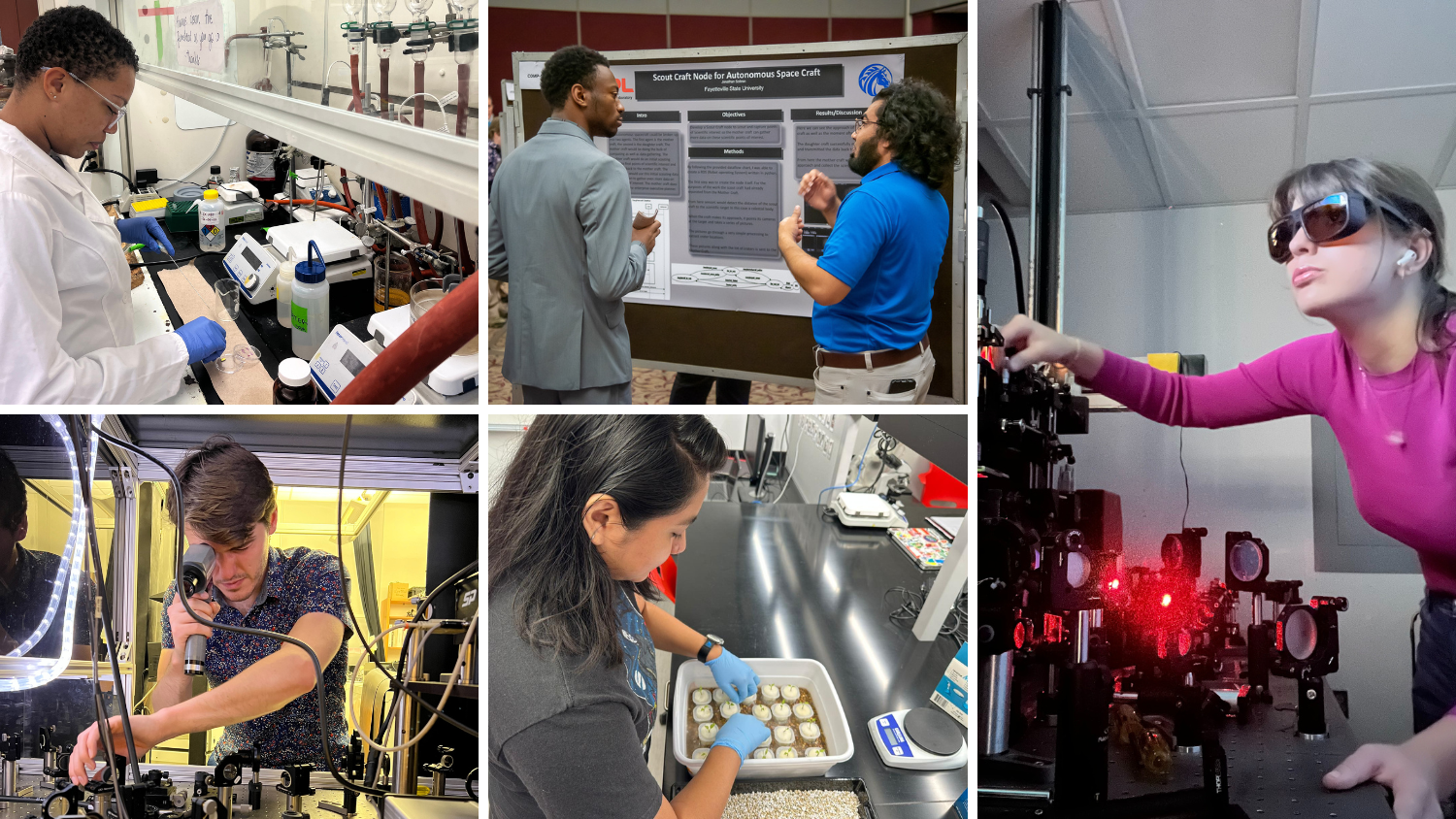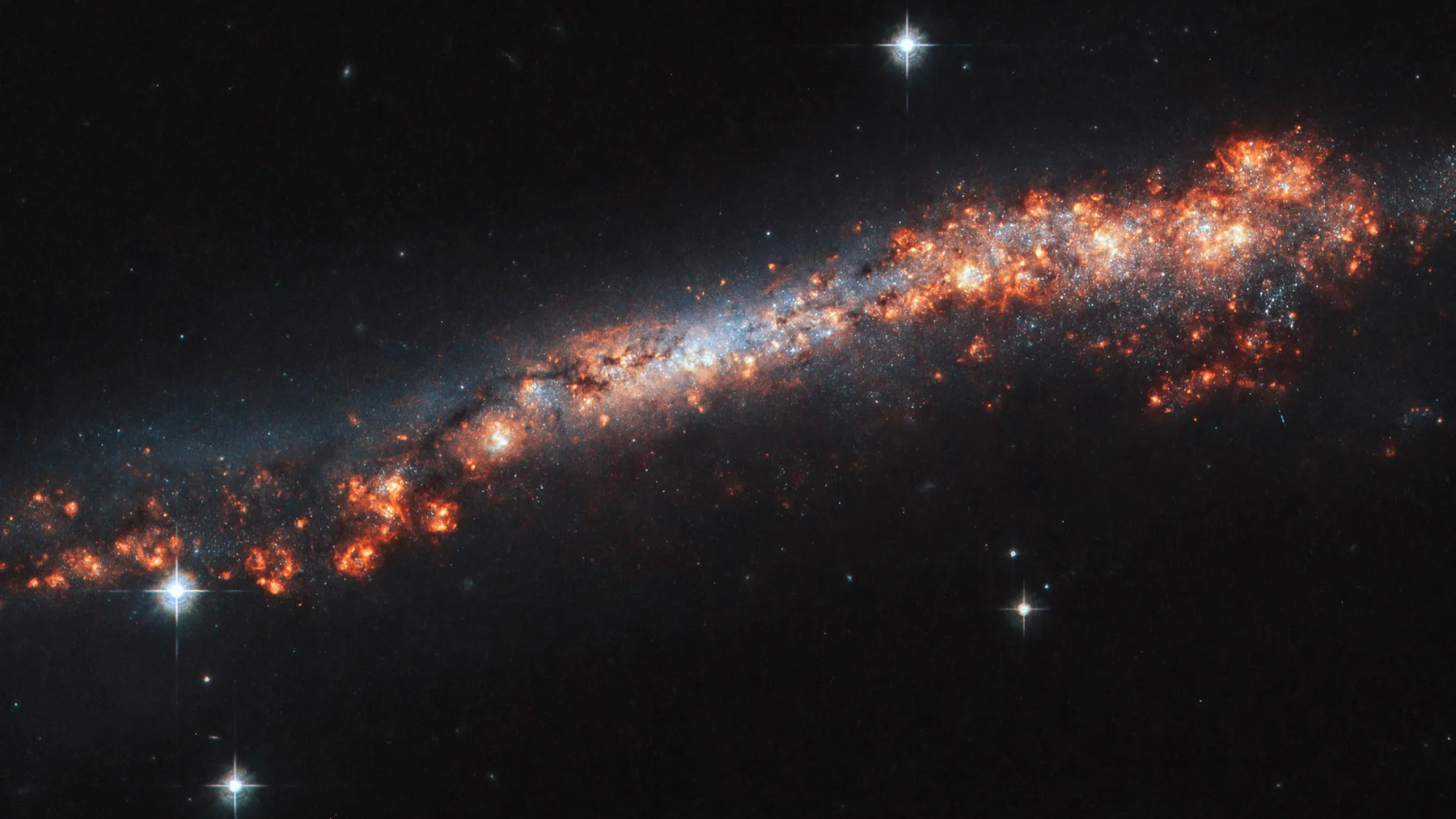WSSU Astrobotany Lab Shows NASA Kennedy Their Skills
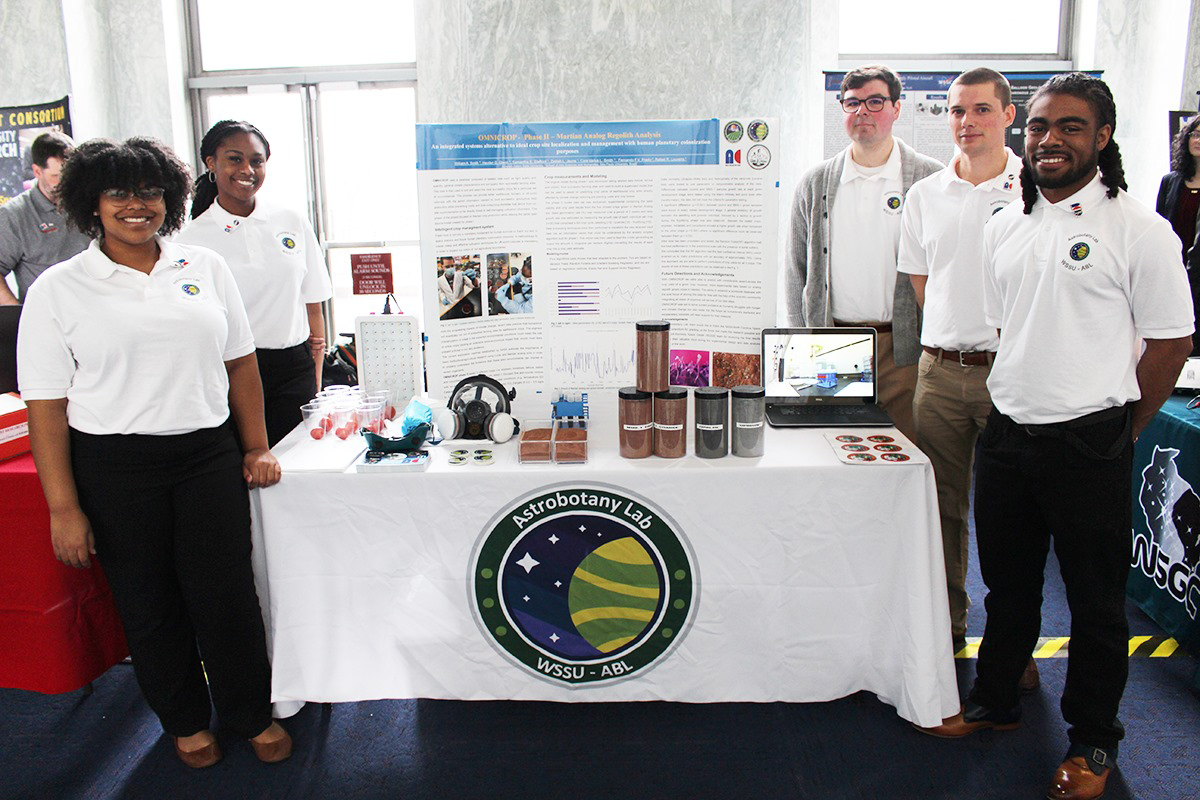
Above from left: The Astrobotany Lab crew; Lauryn Andrews, Hayden Glenn, plant physiologist and lab advisor Rafael Loureiro, William Smith and Brian Evans preparing to share their research at the National Space Grant Program’s 30th Anniversary Celebration this past February.
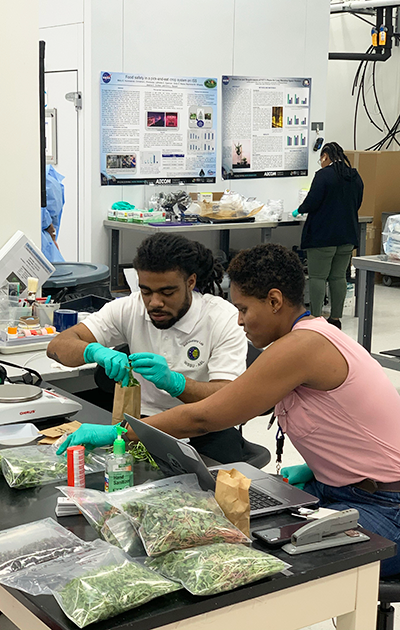
In early March, students from Winston Salem State University’s Astrobotany Lab and their faculty advisor, NC Space Grant-funded faculty researcher Rafael Loureiro, had a unique opportunity to spend spring break at NASA Kennedy Space Center’s Food Production Lab. The WSSU undergraduate students received a face-to-face, hands-on research experience with NASA scientists contributing to projects that are enabling future space exploration.
When the five students arrived at NASA Kennedy with Loureiro, a plant physiologist, to assist the Food Production team, the students were already ahead of the curve. The majority of the tasks involved techniques they were already using in the lab back at WSSU under Loureiro’s tutelage. From day one, they were ready to dive right into their projects.
A typical day for the students consisted of planting seeds, growing plants, collecting and analyzing microbial data, and working inside the growing chambers. Lucie Poulet, a postdoc student working in the lab, evaluated the airflow of the chambers and taught the students how to operate and analyze data from a photosynthesis analyzer. By the time the Astrobotany Lab acquired its own version of this cutting-edge equipment, the students were fully capable of operating it.
One student, Brian Evans, has an interest in microgreens and closely shadowed Poulet, who is a microgreens specialist. Now, Evans gets the opportunity to participate in the postdoc’s discussion group meetings.
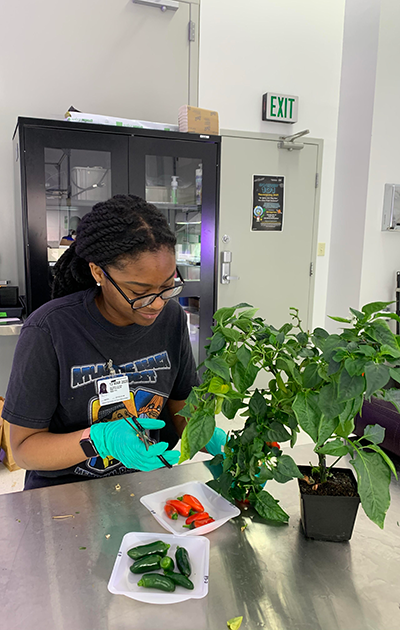
Loureiro points out, “It’s super cool for an undergraduate student to be a part of a NASA discussion group and actually have a voice there.” The level of involvement these students are exposed to from working with their NASA mentors exemplifies how they are impacted by the partnership between WSSU and NASA Kennedy’s Food Production lab.
Another student whose experience expanded from working with the Food Production lab is Hayden Glenn. Glenn worked with her NASA mentor on a plant hormone project and realized this was something she wanted to continue working on. Her mentor was just as enthusiastic about the idea, so Glenn and her labmates worked together to craft a research proposal, so Glenn could apply for an Undergraduate Research Scholarship with NC Space Grant.
Loureiro reminisced on the excitement as the team eagerly helped Glenn prepare for a chance to pursue a research topic she felt passionate about. “We were in the lobby of the hotel until midnight writing this together, discussing what she could do… so she applied, got [the scholarship] and it was great!” recounts Loureiro. Glenn has already begun her NC Space Grant-supported research at the WSSU lab for the summer.
Partnering with NASA
WSSU’s Astrobotany Lab cultivated this special relationship with NASA Kennedy thanks to the Space Act Agreement, which allows students to conduct supplementary research to the projects happening at NASA Kennedy. This agreement was also the start of their yearly spring break trips to do research with the Food Production Lab.
“The agreement allows us to work with things that are not being worked on [at NASA Kennedy]… students get to be highly involved in these experiments as undergraduate students, which is unheard of,” explains Loureiro. “The students learn a lot and [NASA Kennedy] learns a lot from us, as well.”
Loureiro says he and the team expect to publish two papers each year on the research they conduct at their lab in North Carolina and when they visit NASA Kennedy in Florida. “These papers are going to have the undergraduate students in them and the NASA researchers, so this is something that they can use to apply to graduate school or to go directly to the workforce,” he says. “They already have a pretty good stamp on paper,” Loureiro says about their research, “but the fact that they’ve been published with NASA is a great opportunity for these students.”
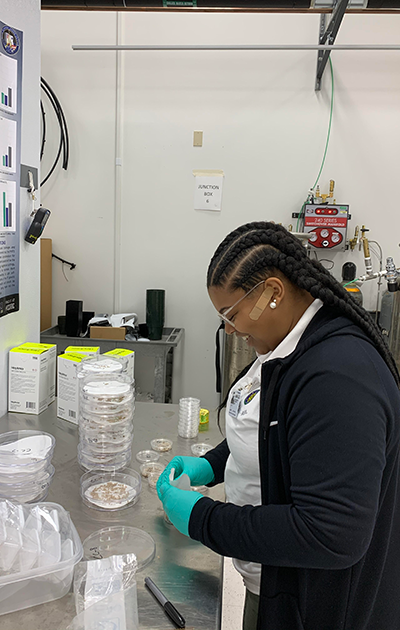
“I would love to have had this opportunity when I was a student and I do believe that it’s something that, for some of them, is truly life changing,” says Loureiro.
Working with students who are dedicated and passionate about working in the Astrobotany Lab, one wouldn’t expect that most of the students come in “hating” plants, Loureiro shares, appreciating the irony of the situation. Most of them began their studies at WSSU wanting to pursue medical or dental school, not yet realizing the broad applications of plant physiology and crop production before they begin working in the lab. Although, once they start, they have an awakening of just how helpful to the world they can be studying plants.
“The students get to understand the plants in a way they’ve never understood them before… seeing that what they do not only has a high impact on future space exploration, but also a high impact here on Earth,” says Loureiro. “Technology that we develop for space can be shared with local farmers to improve their technology on Earth and [identify] problems they are facing with climate change.”
Their advisor stresses the importance of the work to these students. They may be coming into undergraduate wanting to be a doctor down the road, yet the real world applications of their botany research opens up a new door for how to help people. Loureiro says opening their eyes to this field they never thought of exploring is “very gratifying.”
He shares that he and the NASA mentors all feel deep gratitude to be working with these students, giving them an opportunity they might never have without this partnership.
Cultivating the Next Generation
Loureiro’s commitment to his students’ growing experiences in the field directly aligns with NC Space Grant’s mission. He recognizes that for some, the path to pursuing a Master’s and Ph.D. can be very stressful. Thanks to his own work in labs as a student in Brazil, he learned firsthand the importance of a supportive and nurturing culture. He knows that, as a student, feeling comfortable enough to ask an advisor questions or to admit when an experiment has gone wrong is important in cultivating pride and responsibility in the lab environment. Loureiro says, “The pride in their work is what I really try to make [my students] treasure.”
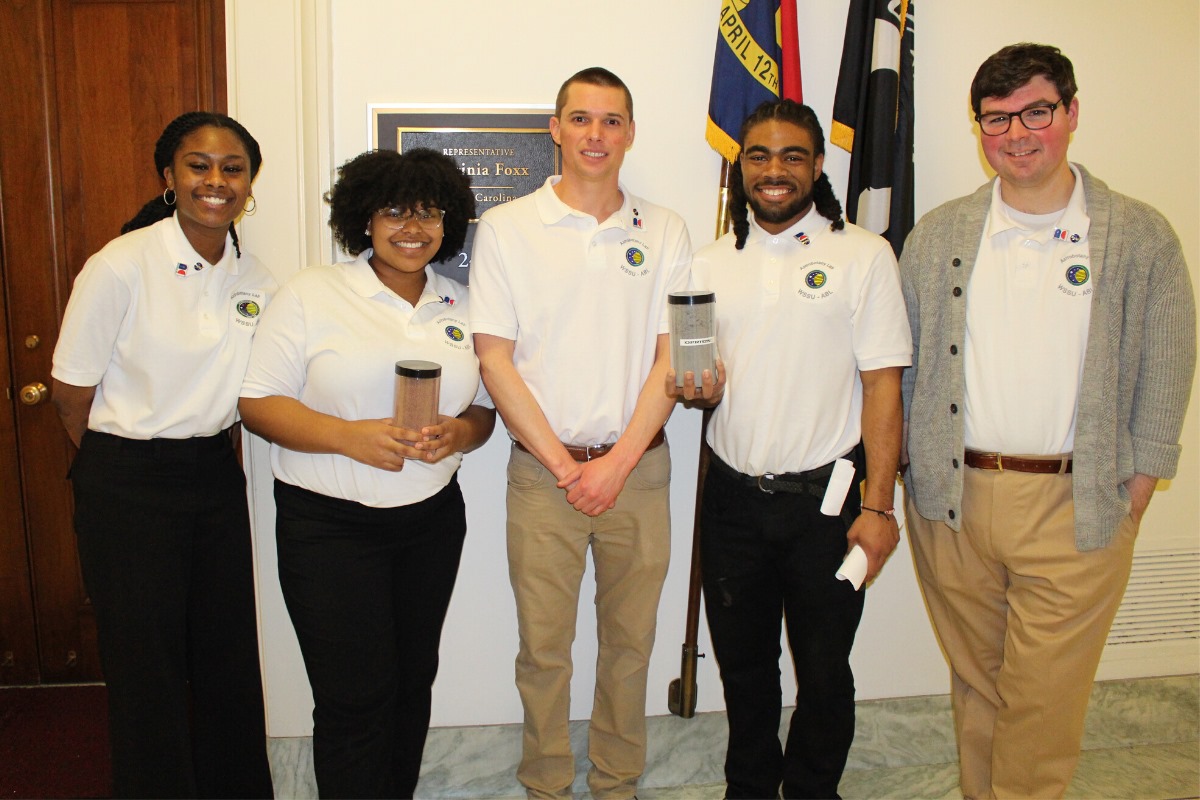
Part of that pride came from being able to talk about their research with legislators at Capitol Hill in Washington, D.C. this past February, when Loureiro and the students accompanied the NC Space Grant team to the National Space Grant Program’s 30th anniversary celebration. For some students, it was their first time meeting other student researchers in the space science field. For the anniversary, students from all across the U.S. came together with their advisors and mentors to show off their hard work.
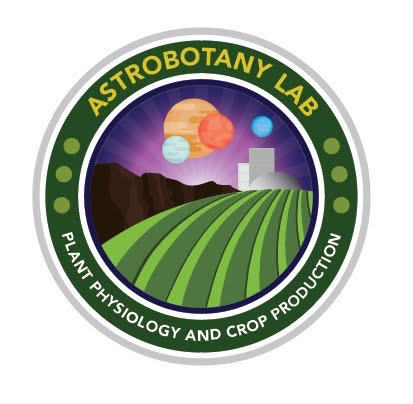
For the WSSU students, it was also their first visit to their Members of Congress’ Washington offices. The Astrobotany Lab students had the unique opportunity to share their science with pride to their representatives and senators and say, “Look at all this cool stuff we do in your state!”
Loureiro reflects on the exciting opportunities his Astrobotany Lab students experienced since the lab’s inception, and attributes part of their success to NC Space Grant. “I couldn’t have landed the Space Act Agreement with Kennedy Space Center without the help of NC Space Grant,” he states, “[Their support] allowed us money to go there and show what we were capable of.”
“This is life-changing stuff,” Loureiro emphasizes. “All these opportunities, which kind of snowballed into these wonderful experiences, are what motivate these students to keep going.”
